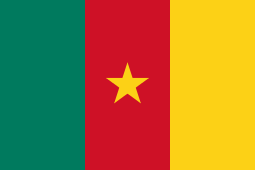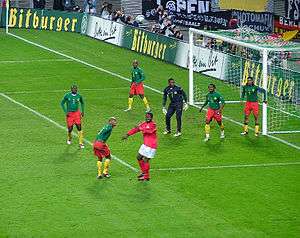Sport in Cameroon
| Part of a series on the |
| Culture of Cameroon |
|---|
 |
| History |
| People |
| Languages |
| Cuisine |
| Religion |
| Literature |
|
Music and performing arts |
| Sport |
|
Monuments |
|
Symbols |
|
Sports in Cameroon is practiced widely by the population and advocated by the national government. Cameroonians take pride in victories at international competitions, making sport an important source of national unity.[1] Traditional sports in Cameroon include canoe racing, swimming, tug of war, and wrestling. Wrestling has featured in the initiation rites and other ceremonies of ethnic groups such as the Bakweri and the Duala.[2] However, in modern times, sports such as basketball, boxing, cycling, handball, netball, and table tennis have become popular.[3] The 40 km (24.8 mi) Mount Cameroon Race of Hope draws several hundred runners each year.[4] Tourists hike, rock climb, and mountaineer, especially up Mount Cameroon.[5] Yaoundé, Tiko and Kribi have golf courses.[6] Rugby union is also played, with about 15 clubs and 3000 players nationally.[7]

The most popular sport by far is football (soccer). Virtually every village has its own football pitch, and large numbers of spectators watch games between rival villages.[2] The Cameroon national football team has gained world recognition since their strong showing in the 1990 FIFA World Cup. The team has won four African Cup of Nations titles. Footballer Roger Milla is known around the world, and the 2003 death of Marc-Vivien Foé during a game made international headlines.[6] Many Cameroonian footballers have gone on to forge relatively successful careers in Europe, including Rigobert Song and African Footballer of the Year winners Lauren Etame Mayer and Samuel Eto'o.
Children begin playing sports in primary and secondary school. At the university level, the National Federation for College and University Sports (FENASCO; Fédération National des Sports Scholaire et Universitaire) organises school competitions. The agency also handles provincial competitions at the primary-school level and national games at the secondary-school level.[8] Many sports have their own organising body, including the Cameroon Boxing Federation (FECABOXE), the Cameroon Football Federation (FECAFOOT), and the Cameroon Handball Federation (FECAHAND). The Cameroon Olympic Committee is another national sports agency,[1] and Cameroon is one of the few tropical countries to have competed in the Winter Olympics.
Sports teams are organised along ethnic lines in Francophone Cameroon and under corporate or departmental sponsorship in Anglophone Cameroon. Teams develop fierce rivalries, and violence is not uncommon during matches. Training of athletes is handled by several sports institutes, including some owned by corporate sponsors, such as the Brasseries du Cameroun's l'École de Football des Brasseries du Cameroun (EFBC) in Douala.[1]
Notes
References
- DeLancey, Mark W., and Mark Dike DeLancey (2000): Historical Dictionary of the Republic of Cameroon (3rd ed.). Lanham, Maryland: The Scarecrow Press.
- Mbaku, John Mukum (2005). Culture and Customs of Cameroon. Westport, Connecticut: Greenwood Press.
- West, Ben (2004). Cameroon: The Bradt Travel Guide. Guilford, Connecticut: The Globe Pequot Press Inc.